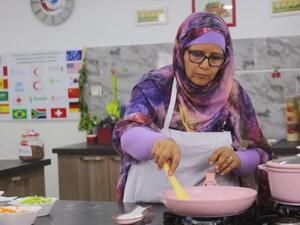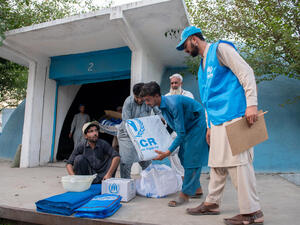UNHCR distributes aid to thousands of Iraqis fleeing attacks in Ninewa
UNHCR distributes aid to thousands of Iraqis fleeing attacks in Ninewa

UNHCR distribution near Duhok this afternoon in northern Iraq's Kurdistan region. Tens of thousands have fled to the region since the weekend.
ERBIL, Iraq, August 5 (UNHCR) - The UN refugee agency has started distributing emergency aid to thousands of people displaced by the latest outbreak of violence in northern Iraq's Ninewa governorate.
Officials in the Iraq's Kurdistan region say some 30,000 people (6,600 families) have fled the fighting that erupted at the weekend between ethnic Kurdish forces and armed opposition groups, who reportedly captured three communities.
The Iraqi government says up to 200,000 may have fled from SInjar and some sought shelter in a mountainous region. UNHCR staff also report that some 3,000 Iraqis fled into Syria from western Ninewa province over the weekend. UNHCR is trying to help them gain permission to cross back into Iraq's Kurdistan region.
Many of the internally displaced Iraqis are staying with friends or relatives in Iraqi Kurdistan's Dohuk governorate, but some 14,000 have moved into the previously empty Bajet-Kandela transit camp near the border with Syria. The facility was built a year ago as a temporary shelter for Syrian refugees and is once more full.
UNHCR has since Sunday provided families with emergency items such as mattresses, quilts, soap and other aid, and plans to send more tents to the host areas in coming days.
On Monday, the refugee agency sent 1,000 emergency kits to meet urgent needs in Shariya, a town 50 kilometres east of the Syrian border with the largest concentration of newly displaced Iraqis. A further 2,000 family tents and 6,000 emergency kits will be sent this week to help these 15,000 people. Local authorities have allocated land for a camp to cope with the inflow.
UNHCR and its partners are monitoring the three main crossing points into Iraqi Kurdistan's Dohuk and Erbil governorates from Ninewa.
Staff from the refugee agency have also noticed a large number of people from ethnic minority groups among the latest exodus, including Yazidis, Shabak, Armenians and Shia Turkmen as well as Christians and some Shia Arabs. Some have been displaced multiple times.
A group of 400 Iraqi Turkmen were on Monday midway between the militant-held northern city of Mosul and Erbil, after having fled new fighting in Mosul in recent days. Some of them told UNHCR protection officers that they had fled because of the threat of kidnapping in addition to targeted violence.
Ahmed*, an ethnic Turkmen and father of eight, told UNHCR at the Khazair checkpoint between Mosul and Erbil that he and others from his community had first fled their farming community near Mosul two months ago after armed opposition groups took control of the city. They moved again on Sunday, when they heard that the groups were heading their way. "We couldn't stay any longer," Ahmed said.
He used to have a good business selling fruit and vegetables from the back of his pickup truck. He said this second move had been the most difficult, because he has had no news of his missing 21-year-old son, who had stayed behind in Mosul and was last seen by neighbours blindfolded and with arms tied behind his back outside his home.
UN High Commissioner for Refugees António Guterres has said minorities are particularly at risk in Iraq. "Everybody needs to be protected," he stressed, during a visit last month to Erbil. "Everybody seeking access should be given refuge without discrimination. Everybody deserves to be safe."
Iraq's Kurdistan region is already home to more than 300,000 internally displaced Iraqis and 220,000 Syrian refugees.
* Name changed for protection reasons
By Ned Colt in Erbil, Iraq








